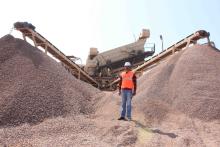
India is a riot for the senses and I had the pleasure recently of spending a working week in the country, visiting quarries and road construction businesses with
Metso Park in Alwar, Rajasthan, is around two-and-a-half hours’ drive from the company’s corporate office HQ in Gurgaon, near Delhi. It’s an impressive site with a fabrication and vibrating equipment factory, mobile crushing plant assembly and test factory, rubber and pump factories, a warehouse and container bay plus offices and a canteen.
You’ll read an in-depth piece on the growth of Metso Park and its strategic importance to Metso in another issue of Aggregates Business International later this year. My tour of the site followed an unforgettable trip to a neighbouring village school. The attendance of girls at the school had dropped significantly due to the lack of adequate water and sanitation facilities onsite. But thanks to a Plan India partnership with Metso the school is now one of 15 government schools around the factory with proper Water, Sanitation and Hygiene (WASH) and recreational facilities. This has led to a notable increase in girls attending school, and judging by the happy faces I met and the colourful school buildings and learning aids dotted around campus, the Plan India-Metso collaboration is a credit to both parties.
The Quarry Profile in this issue of ABI is based on another of my visits during my time in India. Gayatri Projects’s granite rock processing site in Nuh, Haryana state, North West India, is currently a hive of activity producing a minimum of 60,000tonnes/month of premium quality rock and manufactured sand products which will subsequently be turned into concrete for the KGP Expressway, running along the eastern side of Delhi. The KGP Expressway and similar works on the KMP Expressway, on the western side of Delhi, will, once completed, create a triangular traffic corridor around Delhi, helping to reduce crippling traffic congestion in India’s capital city. As you’ll read in the feature, Metso’s intelligent crusher automation along with cutting-edge cone crushing and comprehensive engineering support is enabling Gayatri Projects to meet its one million tonnes of concrete requirement over the course of its KGP Expressway contract.
I heard much of the boom in road infrastructure projects such as the one involving Gayatri Projects during my time in India. And, as much leading independent aggregates business market research analysis notes, the country will, along with China, be the big growth driver for global aggregate demand over the next decade. Having driven past a large number of huge still-to-be completed residential flat builds en route to work appointments in North and Central India, aggregate demand is just as great in India’s residential construction sector.
This issue of ABI also includes an interview with Rwanda-based CIMERWA’s CEO, Bheki Mthembu. The highly successful integrated cement business serves Rwandan, Burundian and the Democratic Republic of Congo’s (DRC) cement requirements. PPC has owned a 51% equity stake in CIMERWA since 2013, seeing it as an important channel for growing its market reach outside the firm’s native South Africa. Inside, you’ll hear how recently-appointed Mthembu plans to work with PPC to take the CIMERWA brand to new commercial heights, while continuing its highly regarded corporate social responsibility work.
With all readers keen to hear about the latest aggregates trading environment in the Middle East, our Middle East Market Report will be of great interest. While oil revenues continue to be depressed, there is still strong aggregate demand across the region, with money already having been committed for infrastructure megaprojects, from the US$22.5bn Riyadh Metro in Saudi Arabia to state-of-the-art football stadia for the 2022 World Cup in Qatar.







